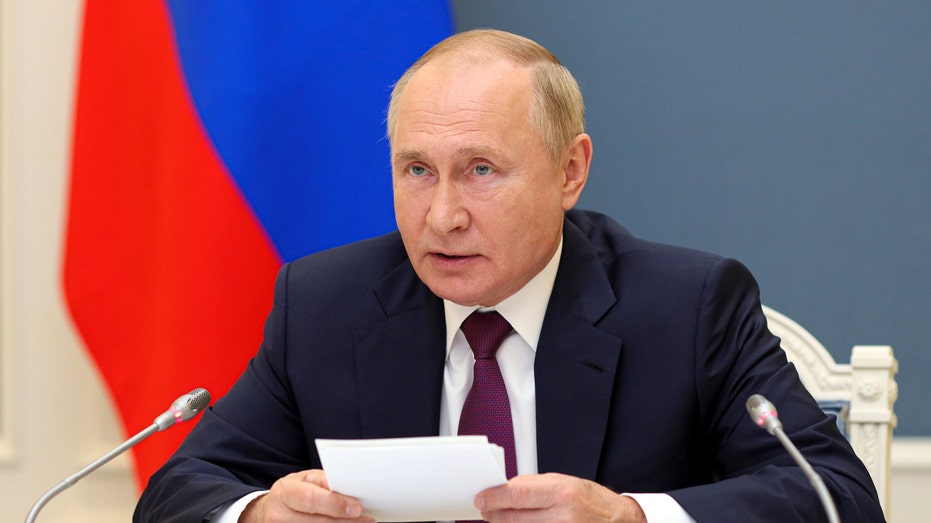It is reported that Russian President Vladimir Putin has ordered the dispatch of troops to the separatist regions of Ukraine. Fox News’ Steve Harrigan with more from Kiev, Ukraine.
we economic inflation It is already at a four-decade high. deterioration UkraineThe Russian crisis may push it to a higher level.
That’s because the conflict threatens to push oil prices above $100 a barrel for the first time since 2014, according to RSM chief economist Joe Brusolas. Oil prices had already climbed to an eight-year high on Tuesday after Moscow ordered troops to join two separate regions in eastern Ukraine, where Brent crude, the global benchmark, hit $97.63.
LIVE UPDATES: The world responds that Putin is ordering troops in Ukraine
Brusolas estimated that a war in Europe – which many foreign policy experts say is a real possibility – could cause oil prices to rise by as much as 20% to $120 a barrel. If that happens, US consumer prices will rise above 10% year on year, the economist said, the highest since October 1981.
Smoke rises from a power plant after bombing outside the town of Shastya, near the eastern Ukrainian city of Luhansk, on February 22, 2022. (Aris Messinis/AFP via Getty Images/Getty Images)
“The potential for a broader energy shock to the global and US economies if Russia invades Ukraine has added to the combustible mix of factors causing inflation to accelerate in the US and abroad,” Brusolas said. “This risk has the potential to slow growth.”
Russia is the second largest producer of oil and natural gas in the world. Conflict or sanctions could further disrupt the oil market at a time when high demand is outstripping limited supplies. The Organization of the Petroleum Exporting Countries and other oil producing countries, known collectively as OPEC+, have resisted calls to increase supplies.
Germany has already halted certification of the Nord Stream 2 gas pipeline from Russia, while the United States and the European Union have floated potential sanctions against Moscow amid reports of continued bombing in eastern Ukraine. President Biden vowed that the United States and its allies would respond “decisively and impose rapid and severe costs on Russia” in the event of an invasion, although it is unclear what it would look like.
US and European officials fear that Russia may retaliate against the sanctions by cutting off the oil and natural gas supplies flowing from Moscow to Europe, driving up prices.

Russian President Vladimir Putin speaks while attending the G20 Summit via video link in Moscow, Russia, on October 30, 2021. (Evgeny Polin, Sputnik, Kremlin Pond photo via AP/AP Newsroom)
Economists at JPMorgan Chase warned that any disruption to Russian supplies could “easily” send the price of oil to $120 a barrel.
American consumers are already facing sticky shock at the pump: A gallon of gas was, on average, $3.51 nationwide on Tuesday, according to AAA — up from $2.63 a year ago. In California, gas prices are over $4 per gallon.
Sanctions imposed on Russia after Putin recognized rebel-held provinces in Ukraine
For months, prices for all kinds of energy — gasoline, diesel fuel, natural gas, oil, and more — have been a major driver behind economic inflation, which rose 7.5% in January, the highest level since 1982. Energy costs are up 27% over the past year, due in part to unbalanced supply and demand. Consumers are traveling more, but the supply side has not kept pace with the demand.
The European crisis escalated this week after Russian President Vladimir Putin approved legislation allowing the deployment of troops to two breakaway regions of Ukraine. Russia has massed an estimated 150,000 troops on three sides of Ukraine, and Biden has repeatedly warned that Putin has decided to invade the country.
Biden and Putin initially agreed to hold a bilateral summit after French President Emmanuel Macron brokered a deal in a last-ditch effort to avert war.

“Infuriatingly humble analyst. Bacon maven. Proud food specialist. Certified reader. Avid writer. Zombie advocate. Incurable problem solver.”
